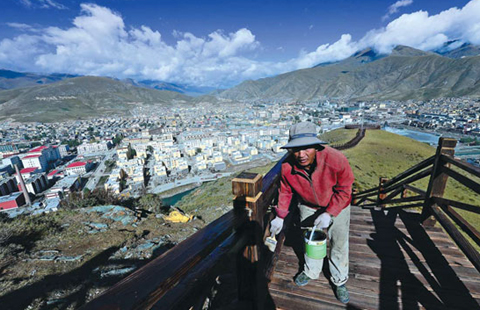Legacy of reform
Updated: 2014-08-21 17:20
By AN BAIJIE(China Daily)
|
|||||||||||
Much like the forays of other aspiring Chinese entrepreneurs starting from scratch, the Nian sunflower seed business began to see the light of day only in 1979, when Deng Xiaoping put forward the policy of reform and opening-up.
Nian Qiang said his family business is indebted to Deng's leadership.

In 1963, businessman Nian Qiang's father was caught selling fish on the streets and sentenced to a year's imprisonment for "speculation".
At that time, only State-owned enterprises were allowed to run a business.
Nian Guangjiu was jailed again for selling chestnuts in 1966, at the start of the "cultural revolution" (1966-76).
But the senior Nian was unfazed. After he was released from prison, the man started selling fried sunflower seeds in 1972 – this time outside working hours to avoid being caught by the police.
Much like the forays of other aspiring Chinese entrepreneurs starting from scratch, the Nian sunflower seed business began to see the light of day only in 1979.
It was a year after the Communist Party of China, led by Deng Xiaoping, put forward the policy of reform and opening-up.
Under the policy, individuals nationwide were encouraged to run businesses and set up private companies. That meant that family enterprises like the Nian's sunflower seed business became legal.
Deng's visionary move fueled the growth of private enterprise and set a milestone for China's market-oriented economy.
These and other achievements of Deng are being remembered and revisited by beneficiaries like the Nian family, amid the 110th anniversary of the birth of the late leader which falls on Friday.
Nian Qiang said his family business is indebted to Deng's leadership.
"It was Deng Xiaoping's policies of reform that allowed our family business to survive," he said.
Chance to thrive
In 1979, Nian Guangjiu registered the "Idiot Sunflower Seeds" brand – after the nickname people gave him because he always handed out bonus amounts of the seeds to his customers.
But the "idiot" became a millionaire a few years later, when his products were snapped up in his hometown of Wuhu city in East China's Anhui province and distributed nationwide.
On Sept 4, 1981, when four local officials, including a vice-mayor and a vice-police chief of Wuhu, visited Nian's family, the businessman became nervous – he was afraid of being arrested for a third time since the policies in the past decades had been fluctuating.The officials did not make trouble. On the contrary, they praised Nian for his entrepreneurship as well as the good flavor of his products.
"We knew later that Deng Xiaoping had expressed his support toward my father's business before the officials visited our home," Nian Qiang said.
But it was yet not smooth sailing for the business. In late 1983, some officials questioned whether his company should be restricted since the number of his employees had reached more than 100.
Under regulations at that time, a private company could hire at most seven workers, and the employers would be punished for "exploitation" if they had a large headcount.
The local government reported the situation to the central authorities.
At a conference on Dec 22, 1984, Deng made his reply -- Nian should not be punished and the government should convince the public that the reform policy will not changed, according to records highlighted by the Selected Works of Deng Xiaoping.
"Once again, we had Deng Xiaoping and his policies to thank," said Nian Qiang, general manager of Idiot Sunflower Seeds Co. Under reform and opening-up, the central authorities increasingly encouraged private businesses like the Nians' in the early 1980s.On Oct 16, 1982, the State Administration for Industry and Commerce held a fair in Wuhan city, capital of Central China's Hubei province, inviting more than 110 private companies in 13 provinces to exhibit and promote their products at the fair, according to a report by Xinhua News Agency.
Private enterprise under three decades of reform and opening-up have transformed the country.
By the end of 2011, there were a total of 9.677 million private enterprises and 37.56 million individual businesses, which employed three times more people than the State-owned companies, according to official statistics.
Last year, priivate businesses employed about 63 percent of graduates from occupational schools and 45 percent of university graduates, according to a bluebook released last month (in July 2014) by the Chinese Academy of Social Sciences.
Great achievements
Deng's historic contributions to China are being commemorated nationwide with the 110th anniversary of his birth which falls on Friday (August 22).
Since early this month, audiences have been glued to their TV sets showing the 48-episode drama series Deng Xiaoping at History's Crossroad.
The series describes Deng's experiences between October 1976, when the disastrous "culture revolution (1966-76)" ended, and 1984, when the policy of reform and opening-up was fully implemented.
On Aug 14, a photo exhibition marking the historical Baise Uprising was also opened to the public in Guangzhou and Shenzhen cities. Eighty-five years ago, Deng led an uprising in Baise city of South China's Guangxi Zhuang autonomous region and set up a revolutionary base there.
In Deng's hometown of Guang'an city, Southwest China's Sichuan province, the Hanlin Primary School, where Deng used to studied, was renamed the Red Army Primary School on Feb 19, the 17th anniversary of Deng's death. Since June, the Study Times, a newspaper run by the Party School of the CPC Central Committee, has published at least four articles related to Deng, including his standard for selecting government officials.On Aug 16, Hu Chunhua, Party chief of South China's Guangdong province, said at a seminar to commemorate Deng that it was Deng who encouraged the historic reform measures in Guangdong.
President Xi Jinping has spoken highly of the reform pushed by Deng many times. On Dec 8, 2012, less than a month after Xi was elected as general secretary of the CPC Central Committee, he visited Guangdong and paid tribute at a statue of Deng in a park.
The CPC Central Committee's decision of reform and opening-up is right, which should be maintained to make the country stronger and the people richer, Xi said to the people in the park.
In November last year, a comprehensive reform package was publicized after the third plenary session of the 18th CPC Central Committee. According to the plan, there would be 60 reform tasks covering the issues including hukou (household registration), urbanization, and family planning. After the session, a leading team, headed by Xi, was established to deepen reform.
The central and local governments' activities in commemorating Deng Xiaoping show that China's top leaders will continue their efforts to deepen reform, said Wang Yukai, a professor of public administration with Chinese Academy of Governance, a government-backed think tank.
The central government has made great achievements in fighting corruption, which is expected to clear obstacles for the reform, he said.
Zhou Qiren, an economist and professor of Peking University, said during a seminar early this year that the central government is facing tougher reform tasks compared with those in the 1980s, according to a report by major information portal Sina.com.
There are many more social problems and conflicts nowadays, including stagnant land reform in rural areas, lack of scientific research in universities, private companies bribing government officials, and serious pollution, he told a seminar.
Zheng Bin, a fodder manufacturer in Rizhao city of East China's Shandong province, said that compared with State-owned enterprises, private companies still face numerous difficulties in many issues including market access and loan applications.
The ongoing reform should bring more opportunities for private companies, especially small and medium size ones, "like what had been offered at the beginning of reform and opening-up", he said.
Zhu Lixin in Hefei contributed to this story.
Related Stories
Deng Xiaoping opens a door for private economy 2014-08-19 17:49
Deng Xiaoping helps a couple to finally wed 2014-08-19 17:44
Deng offers opportunities to talented students 2014-08-19 17:30
China publishes official biography of Deng Xiaoping 2014-08-18 16:23
Deng TV series reflects 'growing political openness' 2014-08-18 09:27
Today's Top News
Telegram good gesture from Pope to China
Japanese firms face $200m fine
Ice Bucket Challenge hits China
Gaza ceasefire talks collapsed
Heinz recalls four batches of infant food in China
WHO says Ebola has killed more than 1,200
Japan looking to buy more stealth fighters
2 Air Force jets collide in Italy, 4 airmen missing
Hot Topics
Lunar probe , China growth forecasts, Emission rules get tougher, China seen through 'colored lens', International board,
Editor's Picks

|

|

|

|

|

|





